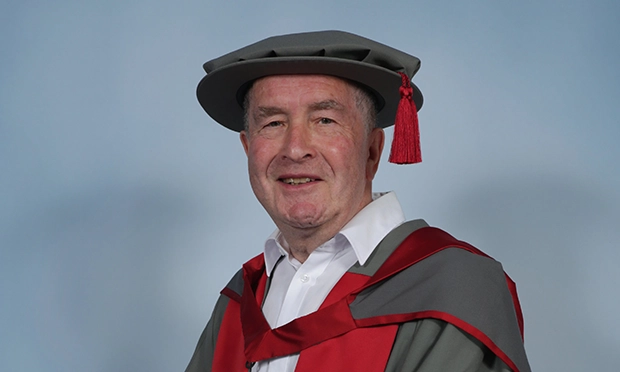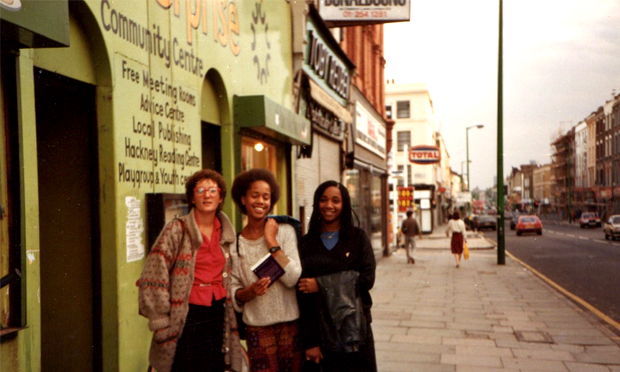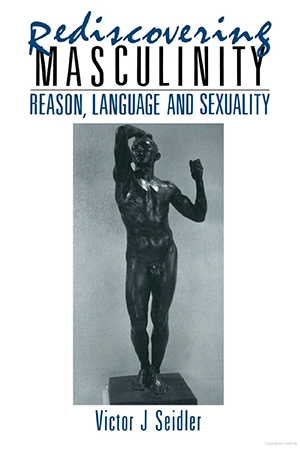‘Traditional masculinity is in revolt’: Honoured scholar Victor Seidler reflects on Hackney’s radicalism and Britain’s unrest

Professor Victor Seidler receives his honorary doctorate. Photograph: courtesy Middlesex University
In June, Middlesex University awarded philosophy and sociology professor Victor ‘Vic’ Jeleniewski Seidler an honorary doctorate.
A long-time lecturer at Goldsmiths University, at 78, his body of work is diverse.
From the meaning of masculinity to the repressed memories of the pandemic, Seidler is animated by upheavals, crises and the relationship between the body, memory, identity politics.
He drifted from Marx decades ago but remains as radical as he is shrewd, and is eager to pick over the recent explosion of far-right rage.
But first, we spoke of the influence of Hackney on his politics and philosophy.
“Before the critical moment, the 1976 oil crisis, and of course Thatcherism, Hackney was an absolutely critical space for the beginnings of the women’s movement and the beginnings of gay liberation.
“With the oil crisis in 1976 and then Thatcherism, the political atmosphere changed radically in East London and across England.
“Before that, you were still in the possibilities of real radical change and transformation.”
With more than a hint of nostalgia, he talks about the radical group’s communal house shared with families in Bow’s Tredegar Square.
“We were almost a community within a community. Our group did a lot of community and industrial work. The kids growing up with us were embarrassed by the fact that our front door was so colourful.”
In 1977, he moved to another communal house in Dalston’s Colveston Square.
“In some ways, our politics was a reaction to feminism. We were emerging out of the Sixties on the left, as a kind of libertarian left, which doesn’t really exist anymore — probably, it’s closer to today’s Green party than any others,” he said.
Seidler remembers the days of the collective as a hotbed of different social movements and activism, including workshops that were run from the Centerprise bookshop on Kingsland Road.

People outside the now-closed Centerprise bookshop in Dalston. Photograph: Maggie Hewitt
For Seidler, philosophy appears as much a matter of doing, of talking to people and firing up discussions as it is writing books.
Hackney was the place where he and others spearheaded the men’s movement which sought to harness the ideas of psychotherapy, along with traditional Marxist theories of class conflict, to get men to open up.
His involvement in anti-sexist magazine Achilles Heel also reflected a vital sense that philosophical and political questions had to be explored in a practical and personal way.
“These groups were about raising consciousness. Men are often fearful of other men being put down by men. They feel closer intimately with women and more tied into competitive relationships with men.
“We were raising questions around this, and how the fear of intimacy produces a need to feel superior.”
He lamented how this kind of work was estranged from modern academic currents, something he considers a consequence of too much postmodernism and theories that were avoidant when it came to lived experience.
“There’s a tyranny of abstraction. Without considering the body, thinking becomes too impersonal.”
Personal history, he argues, is essential to a felt sense of identity.

Image: courtesy Victor Seidler
This approach, coupled with the experience in the men’s movement, was the kernel of his book, Rediscovering Masculinity: Reason, Language, Sexuality, published in 1989.
The book garnered praise and admiration, notably from Bell Hooks, who paid Seidler a visit at Goldsmiths after it came out.
Seidler still sees a lot of work that needs to be done when it comes to masculinity.
“Our culture lacks a way to talk to young men, such that figures like Andrew Tate have become a major influence,” he surmises.
Last year, a Hackney school teacher was one of many educators warning of how misogynistic tropes, harassment and harmful gender stereotypes had been flourishing in classrooms.
Many cited pupils parroting the language of social media influencer Tate, currently awaiting trial in Romania for rape and human trafficking charges.
Seidler is quick to pounce on how pernicious this is becoming, far outside the classroom.
“In a way, although the Tate connection is indirect, his influence cuts across class.
“It’s part of a wider revolt against a certain kind of masculinity, and a toughening of masculinity in a kind of reassertion, a kind of white male English sense of identity.”
We come onto violent unrest from the far-right that recently swept the country and saw the targeting of asylum seekers and ethnic minorities.
There is certainly class resentment at play here, Seidler argues, but also a crisis of male identity.
“The notion of tough masculinity has post-colonial echoes. You know, ‘We rule the world, we’re England, we won the Second World War’.
“It’s partly because it’s one of the few sources of strength that people can fall back on: ‘as a man, I’m superior and I’m tough’.
“The migrant story touches on weak borders, and migrants become a kind of threat to the nation that men can reassert a kind of strong male identity, especially during unemployment or economic hardship.
“These men likely don’t feel like the master of the house any longer, and the result is violence in the streets.”
Though a creature of the left, Seidler does not exhibit the same level of antipathy of many outspoken socialists towards Britain’s new Prime Minister.
The first real test of Keir Starmer’s leadership was in response to the far-right riots across the UK, which included fast-tracking convictions and a law and order blitz.
Seidler did find Starmer’s political language curious, countering that although a feeling of emasculation was no doubt driving the riots, it wasn’t just men unleashing havoc on the streets and terror at asylum hotels.
“By denouncing everyone as a ‘thug’, Starmer seems to want to close down communication and the possibilities of dialogue.
“These crackdowns are in a way a parallel to the same reassertion of masculinity. There’s an authoritarian mood to it, which is not necessarily an antidote.”
This attention to the power of language has been a motif through Seidler’s work: how we use it is what allows, or makes it impossible, for us to fully embrace the past and deal with it.
On a collective level, he says, we can see Covid-19 as a perfect example of people who can stop talking about something, as if to wish painful memories out of existence (he recently wrote a book on the subject).
However, this is equally about individuals, and for Seidler, this has a tragic, personal dimension.
For years, he would refer to his grandfather, who was murdered by Nazis in the Holocaust, as “my mother’s father”, as if unconsciously refuting that such horror could be so close behind him.
Rekindling his relationship with his ethnicity and family history quite late on has led him away from the universalism of the left and its lack of appreciation for psychology and personal history.
“Life is a gradual process of deepening your connection with yourself and having access to different parts of yourself. Not many people on the left today I think grasp this.”
A child of first-generation Jewish immigrants from Germany, Seidler now sits on the board of the Institute for the Study of Global Antisemitism and Policy.
The conversation turns to Israel’s war on Hamas in Gaza, where he again is forced to distinguish himself from others on the left.
“This is a crisis of Judaism as well as Zionism. The terrible, unspeakable things that Israel, controlled by a far-right government, is doing in Gaza cannot be legitimised by the attacks of 7 October.
“But the left has a thin idea of what Zionism is and its history. There’s also this unhelpful idea that to be a ‘good Jew’ you need to oppose Israel.”
Seidler has no intention to stop working. Our conversation itself interrupted several days of writing for him.
Abuzz with insight and sensitivity, he is conflicted about his recent writing about the war.
“I thought it would be more useful to wait a year or two. But I’m constantly rethinking it.”
Professor Seidler’s recent book, Covid-19 and Global Inequalities: Vulnerable Humans, is available from Routledge.
